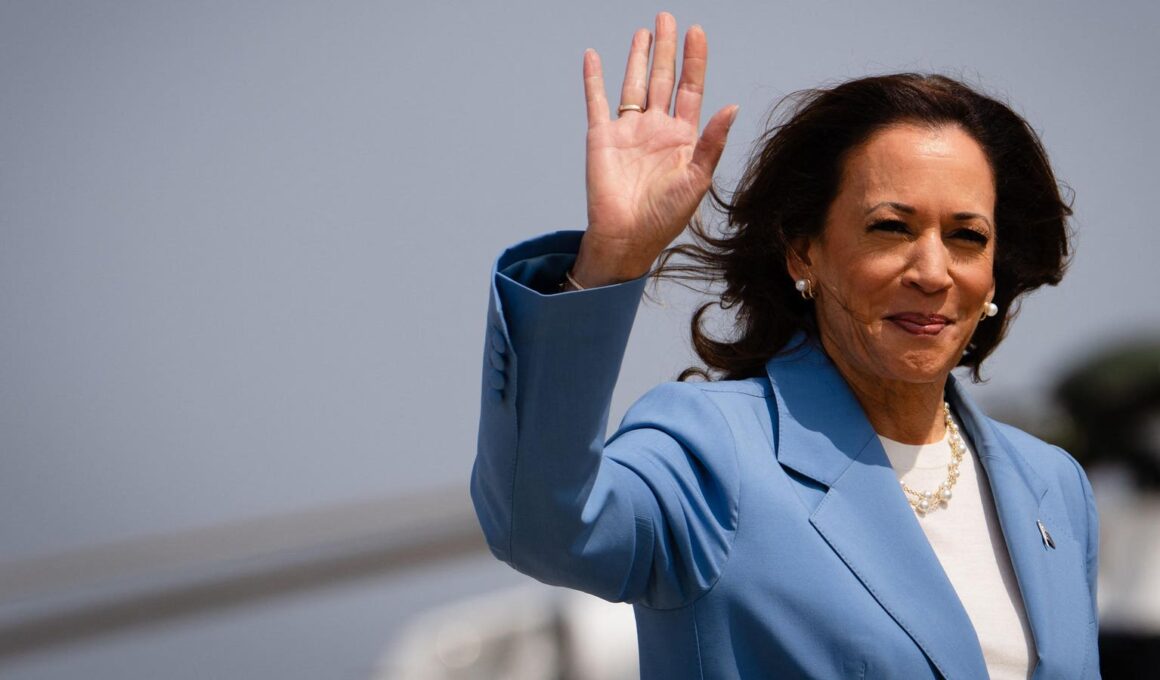Topline
Central to Vice President Kamala Harris’ economic agenda is a proposal to combat “price gouging” on food products, an initiative aimed at tackling voters’ top priority in inflation, though the benefits of the bold plan are not immediately clear, and it faces a wall of criticism from industry groups and some economists.
US Vice President Kamala Harris on Friday.
Key Facts
Price gouging can broadly be defined as when sellers charge more for a product than the fair market dictates based on supply and demand in order to make a higher profit, typically taking advantage of an adverse situation—think ballpark vendors charging twice the normal gameday price for a bottle of water when it’s 100 degrees.
But price gouging is not a “technical term in economics,” according to the Federal Reserve Bank of Richmond, meaning the concept is far from agreed upon like other economic effects such as supply and demand or the inverse relationship between inflation and unemployment, and it’s less clear what the effects of efforts to limit price gouging would look like or their efficacy.
The Harris campaign said Friday it plans to ban price gouging to combat “the excessive prices unrelated to the costs of doing business that Americans have seen in the food and grocery industry,” as well as crack down on mergers and acquisitions in the food industry to keep competition robust.
Yet it remains unclear that restrictions on grocery price increases will have the intended effect of helping the American consumer, as food prices are historically fickle as they can go up or down based on a variety of factors, like less rain in Western Africa causing cocoa prices to skyrocket or an American avian flu outbreak causing egg prices to spike, in addition to the alleged corporate greed.
And it’s hardly a consensus view that corporate profit taking was the sole driver of soaring food prices: A Federal Reserve Bank of San Francisco study published in May found “rising markups have not been a main driver” of inflation over the last three years.
“Price regulation can be beneficial, but it’s tricky,” Carnegie Mellon University economics professor Felix Koenig explained to Forbes.
Would A Price Gouging Ban Work?
“The kind of logic that Kamala Harris and others are proposing is that these markets aren’t really competitive,” said Koenig, adding the “key question” is whether or not they are regulating an “imperfect” market. That’s a critical distinction considering price caps in an already competitive market can have the unintended effect of discouraging new companies from entering a market, making an industry less competitive over the long run. “Economists generally oppose most price controls, believing that they produce costly shortages and gluts,” wrote Federal Reserve Bank of St. Louis economist Christopher J. Neely in a 2022 article.
Big Number
27%. That’s how much more expensive groceries were last month than they were in July 2019, according to the consumer price index’s food at home subcategory. That equates to 5.4% annualized grocery inflation over the last five years, a reflection of the continued strain on Americans to put food on their tables even as price increases moderate, with year-over-year grocery inflation coming in at 1.1% in July.
Chief Critics
Harris’ proposal to curb price gouging inspired a litany of pushback from economic policy experts from both sides of the aisle, unsurprising considering it goes against the basic economic principle of potentially undue intervention. Brian Riedl, senior fellow of the right-leaning Manhattan Institute, told The Washington Post it “represents a return to the lazy, failed economic policies of the 1970s, when price controls proved to be a disaster for the economy,” and Jason Furman, an economist at Harvard University and a Biden administration official, told The New York Times: “This is not sensible policy, and I think the biggest hope is that it ends up being a lot of rhetoric and no reality.”
Further Reading
Trump Media to the Saudi Arabian influence on golf and what real-life billionaires think of ” Succession.” Send tips to dsaul@forbes.com. Follow Saul for analysis on the biggest daily economic and stock market happenings, ranging from inflation data to tech earnings to deep-dives on hot button assets.
“>








